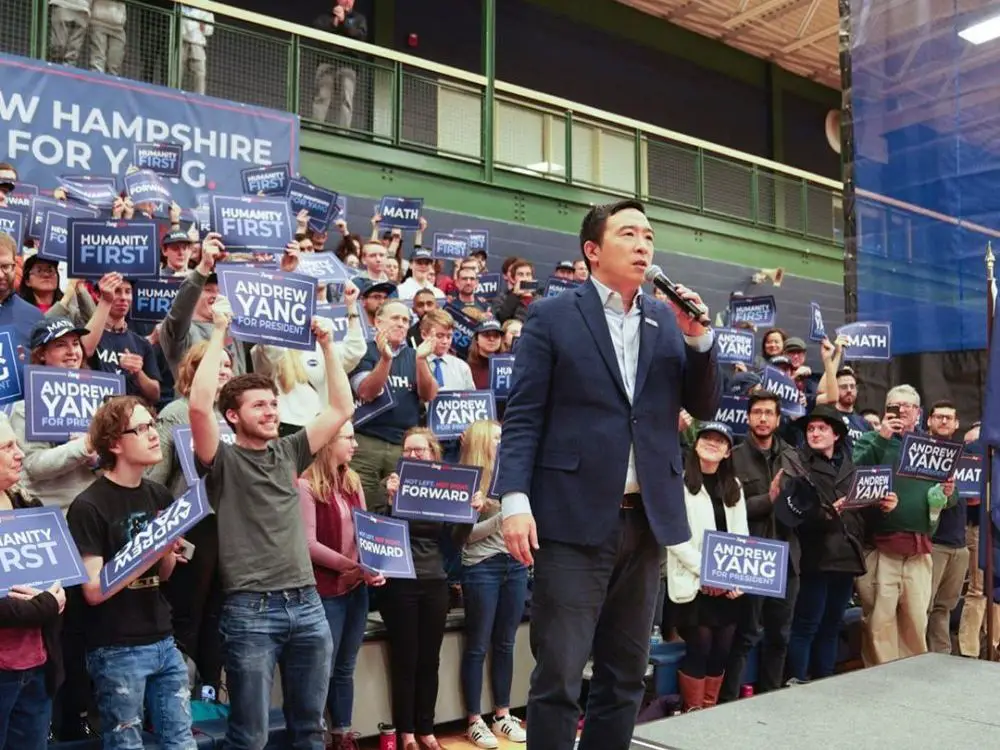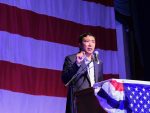Universal basic income (UBI) is one of the most contentious policies to come to the attention of the electorate. It couldn’t have come from any other candidate aside from the notoriously forward-thinking Andrew Yang, a man whose vision of a future dominated by AI and automation is as dystopic as it is plausible.
Even though Yang’s campaign generated considerable attention for his policies, the young, politically inexperienced entrepreneur was never going to win the Democratic primary; Yang never managed to break past a measly 4.9% in the polls. He had a primarily young and internet savvy fanbase that created vaporwave-style merchandise in his honor and spread the infamous slogan, “Yang 2020, let’s get that bag!” In many ways, the aspiring politician became a meme before he had the chance to break out.
But for Yang and his supporters, this did not necessarily matter. The grassroots candidate brought widespread public attention to the concept of UBI, and he argued for it well. What was once a fringe theory on the far ends of the political spectrum became a topic of debate in households all over the country.
However, what many may not know is that UBI as a policy has existed in the States for a long time, and paradoxically, it has the potential to increase federal efficiency while simultaneously burning away the bureaucratic rot started under Franklin Delano Roosevelt.
Universal basic income was first formulated by Spanish-born humanist writer Juan Luis Vives. In 1526, Vives proposed a welfare system that gave reasonable stipends to every subject. His pitch was shockingly devoid of the moralistic judgements of his time. He wrote, “Even those who have dissipated their fortunes in dissolute living — through gaming, harlots, excessive luxury, gluttony and gambling — should be given food, for no one should die of hunger.”
This idea would inspire Thomas Paine to advocate for a “national fund” in his pamphlets, one that awarded 15 pounds sterling to every American at the age of 21, then 10 pounds every year after the age of 50. Martin Luther King Jr. was also a notable proponent and wrote of it as a moral duty in his final book, “Where Do We Go from Here: Chaos or Community?”
The universal basic income movement was effectively buried at the federal level after the introduction and rejection of Nixon’s 1969 Family Assistance Plan, which proved unpopular in the Senate. Canada was a bit more experimental. The country launched several smaller-scale UBI programs around the same time. The most notable of these was the Mincome Program, a UBI plan that covered all citizens of Winnipeg and Dauphin based on their income levels.
The results were striking — from 1974 to 1979, the cities saw a drastic increase in university applications, high school graduations and total time spent at home with families. Most importantly, it showed a near-zero reduction in the labor market; this was in contrast to the fear that UBI would make people lazy.
Since 1976, Alaska has had its own state-run UBI program called the Permanent Fund Dividend, which takes 25% of the oil revenue generated in the state and puts it into a fund for when oil markets plummet or Alaska eventually runs out. Each year, a stipend from the fund is given to qualifying Alaskan citizens. The stipend varies on the Permanent Fund’s performance, ranging from $331.29 to $2,072 a year. Just like with the Mincome Program, the fund has had no effect on employment rates.
These employment figures are vitally important to consider if UBI is going to have any future, as the case against it is almost entirely predicated on labor-market fears and its potential to devolve into a bureaucratic mess. There is a common sentiment among libertarian-minded economists and politicians that a UBI will replicate the results of Soviet-style communism. Soviet-style communism saw glaring productivity issues caused in no small part by an apathetic wage system that promised a fixed-income for fulfilling basic quotas.
Just like with the case studies mentioned above, there is no hard data that shows this is the case. Many other cities around the globe that have instituted a basic UBI system have achieved similar results to the Mincome program. Even in areas and communities where drug abuse is rampant, benefactors rarely — if ever — used their stipends to fund drug habits. The money went to basic expenses like food, rent and internet.
As Andrew Yang and other influential UBI supporters like Elon Musk have pointed out, the well-studied effects of automation and outsourcing make most of the manufacturing and service-dependent American job sector obsolescent, which demonstrably outweighs the harm that UBI would bring.
Universal basic income could also dramatically decrease government spending and bloat. The primary issue that the current American welfare and Social Security systems face is not a lack of funding, but a lack of efficiency. There are just too many programs, employees and conditions set by said systems that make them lose far more money than they give to at-risk individuals.
There are hundreds of federally-operated welfare programs that all need funding and staffing, but they are rife with corruption and mismanagement. For example, a third of federal TANF spending and half of state TANF spending were “in other areas.” That is to say, wasted money not allocated to welfare.
A standardized UBI program of $500 to $1000 dollars a month could feasibly get the same results as these hundreds of overlapping programs. However, it would cover far more people at a cheaper cost, using an already existing IRS infrastructure. It would also reduce the strain on already taxed state and city governments, which could cut back on their own failing welfare programs, as the federal stipend covers the cost for essential items.
Students would be one of the largest benefactors of a UBI arrangement. College students currently lose $242 per month to debt, while 16.5% of the students are losing up to $450 per month, with the most unfortunate 8.5% losing upwards of $750 a month.
UBI would greatly lessen the impact of the current debt crisis while also providing students with more discretionary income — income that can be used to start families and businesses. Loans themselves would also be dramatically cut; students earning a stipend would not have to take on as much debt to afford housing and tuition.
We may not have to wait long to see a wide scale resurgence in experimental UBI policy. The effects of the COVID-19 outbreak and resulting quarantines have shown that the current safety nets afforded to Americans in economic crisis are almost nonexistent.
The necessity for a direct to deposit $2.2 trillion economic stimulus package is an example of how irrelevant current relief programs are, and how cutting the tape and delivering funds directly is the best way to redistribute sorely needed funds. It might not be a true universal basic income system, but it is a sign of the times and a changing world, one where everyone might need that monthly bag.

















